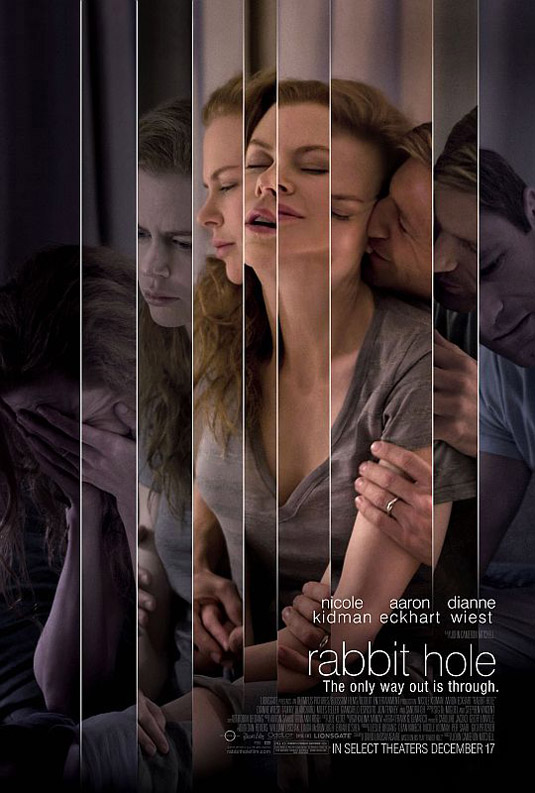Rabbit Hole
Posted on December 23, 2010 at 7:43 am
B+| Lowest Recommended Age: | Mature High Schooler |
| MPAA Rating: | Rated PG-13 for mature thematic material, some drug use and language |
| Profanity: | Strong language |
| Alcohol/ Drugs: | Drinking, marijuana |
| Violence/ Scariness: | References to tragic deaths, tense and unhappy confrontations |
| Diversity Issues: | Diverse characters |
| Date Released to Theaters: | December 17, 2010 |
When you suffer a devastating loss, there is the pain of missing what you once had. But there is pain that goes beyond the space circumscribed by the person who is gone. Grief is its own planet and everyone who goes there lives alone.
“Rabbit Hole” begins eight months after the death of a little boy. His parents move like highly functional but very fragile zombies through their lives. Some of those around them, think and even use words like “closure” and “move on” and even “try again,” mostly out of their own discomfort at the way this loss has threatened their own sense of the rightness of the world. Others just stay away, paralyzed by their inability to think of anything to say in this most unthinkable of moments. And Becca (Nicole Kidman) and Howie (Aaron Eckhart) are still being confronted with horrifically painful decisions — should they keep or get rid of their child’s things? — and even more painful reminders that for others life goes on (Becca’s careless sister is pregnant). 
David Lindsay-Abaire has sensitively adapted his award-winning play by to the screen and with director John Cameron Mitchell (“Hedwig and the Angry Inch,” “Shortbus”) has filled the story with privileged moments, beautifully performed by Nicole Kidman (Becca) and Aaron Eckhart (Howie). Both of them have to find a way to re-invent their interaction with the world or perhaps to re-invent their understanding of what world they live in. Her response is to hold everything inside, to try to maintain control. She affects an almost grotesque normality. When he comes up behind her for a hug as she is at the stove, she is bright but brittle as she shoos him away. She rolls her eyes at the support group for bereaved parents and will not return. But Howie wants to hold on to his memories and process his pain; he needs that kind of contact. He stays in the group. He keeps watching a video of their son — until Becca erases it.
They cannot reach out to each other, but each reaches out to someone else who is uniquely understanding. Howie becomes close to the leader of the bereavement group (Sandra Oh). And Becca watches and then begins to talk to the teenager who was driving the car that killed her son. It is heart-wrenching to see how he is able to reach her instincts as a mother, feelings for which she no longer has any other place.
This is a touching, insightful film with exquisite performances. If we all grieve on our own planet, it is art like this that illuminates the way home.
Parents should know that the movie is about parents coping with the devastating loss of a child; it includes strong language, drinking and drug use, and sexual references
Family discussion: How would you describe the different ways that the characters tried to deal with their loss? Why was it so hard for them to talk to each other about how they felt? What does the title mean?
If you like this, try: “Moonlight Mile” and “The Greatest”
